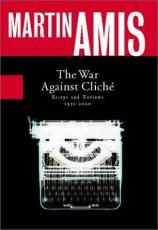The War Against ClichÉ
Review
The War Against ClichÉ
First things first. Martin Amis is a fantastic writer; a perfect
writer, maybe. His prose is assured, balanced, metered, elegant,
everything good writing is supposed to be. His sentences march like
soldiers. His punctuation is sublime. The book reviews, which
comprise nearly all of THE WAR AGAINST CLICHÉ, are testaments
to Amis's erudition and refinement. There is a certain sick
pleasure to be derived from watching Amis take some sad sack
(usually American) novelist apart for failing to comprehend proper
syntax or the full meaning of a word used carelessly. Amis gets
away with this highfalutin behavior because, unlike most critics,
he has the kind of success as a novelist that makes charges of sour
grapes irrelevant. He's a writer/critic, in that order, and as Amis
points out, there is historical justification for what he is
doing.
Although THE WAR AGAINST CLICHÉ is composed of reviews
published from 1971 to 2000, two coherent arguments emerge from the
text. One forms the title of the collection: Amis doesn't like
clichés; he thinks they're a primary cause of bad literature.
The other is that writers should be critics --- and maybe
vice-versa --- and that the responsibilities of a writer-critic are
different from those of a regular critic: In the simplest terms, it
is the responsibility of a writer-critic to defend his turf, to be
a booster of his own approach to literature. Amis's justification
for this stance is largely historical. The laundry list of
writer-critics of yesteryear that he trots out is certainly
impressive: Nabakov, Joyce, Wolfe, and so on.
So why, with all its ducks in a row credibility-wise, is THE WAR
AGAINST CLICHÉ at times so unsatisfying? The quick answer is
that in reviews, great prose is only great prose --- it's not the
whole game, not even half of it. Great ideas are more the point,
and this is where the book is lacking. Amis's reviews are witty,
even true, but they're limited in scope; his criticisms are of
little consequence to people outside the literary establishment, to
ordinary readers. What he's doing is literary theory. The trouble
with THE WAR AGAINST CLICHÉ --- and the joy of it --- is that
Amis doesn't seem to realize this.
Most of the reviews in the collection come from middlebrow
publications like The Atlantic or The Observer. I
mention this to distinguish the places Amis chooses to write from
the places he could write if he preferred to, namely literary
journals, whose thick, non-glossy editions are sold to university
libraries and guys in berets. I give credit where credit is due;
Martin Amis doesn't try to be highbrow. His aim is to focus his
considerable gifts as a writer on issues of import to everyday
people --- or at least everyday people who read tony magazines. But
his split mission is never entirely successful. While I enjoyed his
pieces on Margaret Thatcher, Abe Lincoln, and Chess, I didn't get
much out of his literary critiques. Part of the problem is mine: I
just don't know enough to evaluate his arguments. But the other
part of the problem is Amis's: who wants to read a pithy three-page
critique of someone else's critique of Philip Larkin?
What ultimately saves Martin Amis is that he is such a ham, so
showbiz, so sentimental, even in a highly technical argument about
the virtues of this or the drawbacks of that. He just loves human
beings and their idiosyncrasies. He's a novelist, after all. Amis
is also refreshingly uninterested in appearing professorial and
disinterested. He'll gladly cheer his favorites (Saul Bellow,
Philip Larkin) and forgive their shortcomings, while reserving his
venom for authors who irritate him (Robert Parker, Michael
Crichton). What results then is a strange mixture of literary
theory and yarn-spinning. It works about half the time.
The final piece of the Amis puzzle is Amis himself. Instead of the
reserved, serious literary lion that some would like him to be, he
comes off as a pretty fun guy. He's into football (soccer), chess,
playing with his kids. The reason we know all of this is that ---
again, the ham --- Amis can't help but be a little bit
autobiographical. As someone with a great fondness for many aspects
of American culture, he seems to have inherited some of this
country's obsession with self-obsession. And it works for him. In
addition to everything else, THE WAR AGAINST CLICHÉ is also
the work of a columnist. Although you have to get through a lot of
intelligent criticism to get to it, the book works as a series of
installments from a witty friend. I found myself wondering, "What
would Martin think of the Academy Awards. I hope he covers them."
He doesn't. But he does go into Andy Warhol, the men's movement,
traveling, and various other detritus of modern life.
THE WAR AGAINST CLICHÉ is a lot of things --- it's a big
doorstop of a book, after all. It's perhaps useful to some as
literary theory. To me it was just boring on that front. On the
other hand, it's the work of a great writer with an interesting and
informed outlook. If you stick with it, there are rewards to be
gleaned from nearly every essay in the book --- just not
necessarily from where you'd expect them; the trick is to tune out
the dull stuff. That's your pal Martin: He can be a bit stuffy and
pretentious but he's smart and funny when you get him going. He's
like his book that way.
Reviewed by Fred Kovey on January 24, 2011
The War Against ClichÉ
- Publication Date: November 21, 2001
- Genres: Essays
- Hardcover: 512 pages
- Publisher: Miramax Books
- ISBN-10: 0786866748
- ISBN-13: 9780786866748




